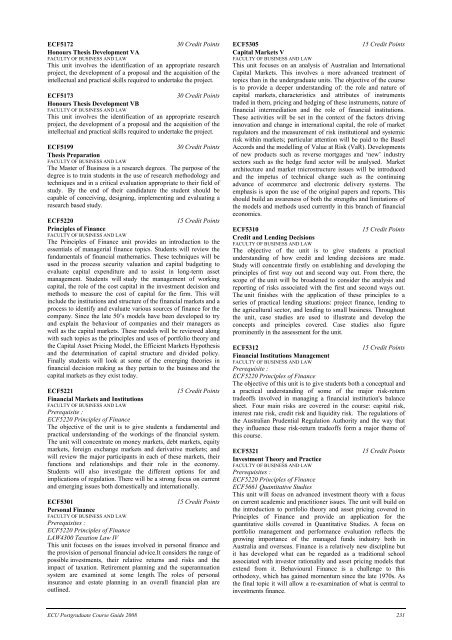Postgraduate - Edith Cowan University
Postgraduate - Edith Cowan University
Postgraduate - Edith Cowan University
Create successful ePaper yourself
Turn your PDF publications into a flip-book with our unique Google optimized e-Paper software.
ECF5172 30 Credit Points<br />
Honours Thesis Development VA<br />
FACULTY OF BUSINESS AND LAW<br />
This unit involves the identification of an appropriate research<br />
project, the development of a proposal and the acquisition of the<br />
intellectual and practical skills required to undertake the project.<br />
ECF5173 30 Credit Points<br />
Honours Thesis Development VB<br />
FACULTY OF BUSINESS AND LAW<br />
This unit involves the identification of an appropriate research<br />
project, the development of a proposal and the acquisition of the<br />
intellectual and practical skills required to undertake the project.<br />
ECF5199 30 Credit Points<br />
Thesis Preparation<br />
FACULTY OF BUSINESS AND LAW<br />
The Master of Business is a research degrees. The purpose of the<br />
degree is to train students in the use of research methodology and<br />
techniques and in a critical evaluation appropriate to their field of<br />
study. By the end of their candidature the student should be<br />
capable of conceiving, designing, implementing and evaluating a<br />
research based study.<br />
ECF5220 15 Credit Points<br />
Principles of Finance<br />
FACULTY OF BUSINESS AND LAW<br />
The Principles of Finance unit provides an introduction to the<br />
essentials of managerial finance topics. Students will review the<br />
fundamentals of financial mathematics. These techniques will be<br />
used in the process security valuation and capital budgeting to<br />
evaluate capital expenditure and to assist in long-term asset<br />
management. Students will study the management of working<br />
capital, the role of the cost capital in the investment decision and<br />
methods to measure the cost of capital for the firm. This will<br />
include the institutions and structure of the financial markets and a<br />
process to identify and evaluate various sources of finance for the<br />
company. Since the late 50’s models have been developed to try<br />
and explain the behaviour of companies and their managers as<br />
well as the capital markets. These models will be reviewed along<br />
with such topics as the principles and uses of portfolio theory and<br />
the Capital Asset Pricing Model, the Efficient Markets Hypothesis<br />
and the determination of capital structure and divided policy.<br />
Finally students will look at some of the emerging theories in<br />
financial decision making as they pertain to the business and the<br />
capital markets as they exist today.<br />
ECF5221 15 Credit Points<br />
Financial Markets and Institutions<br />
FACULTY OF BUSINESS AND LAW<br />
Prerequisite :<br />
ECF5220 Principles of Finance<br />
The objective of the unit is to give students a fundamental and<br />
practical understanding of the workings of the financial system.<br />
The unit will concentrate on money markets, debt markets, equity<br />
markets, foreign exchange markets and derivative markets; and<br />
will review the major participants in each of these markets, their<br />
functions and relationships and their role in the economy.<br />
Students will also investigate the different options for and<br />
implications of regulation. There will be a strong focus on current<br />
and emerging issues both domestically and internationally.<br />
ECF5301 15 Credit Points<br />
Personal Finance<br />
FACULTY OF BUSINESS AND LAW<br />
Prerequisites :<br />
ECF5220 Principles of Finance<br />
LAW4300 Taxation Law IV<br />
This unit focuses on the issues involved in personal finance and<br />
the provision of personal financial advice.It considers the range of<br />
possible investments, their relative returns and risks and the<br />
impact of taxation. Retirement planning and the superannuation<br />
system are examined at some length. The roles of personal<br />
insurance and estate planning in an overall financial plan are<br />
outlined.<br />
ECF5305 15 Credit Points<br />
Capital Markets V<br />
FACULTY OF BUSINESS AND LAW<br />
This unit focuses on an analysis of Australian and International<br />
Capital Markets. This involves a more advanced treatment of<br />
topics than in the undergraduate units. The objective of the course<br />
is to provide a deeper understanding of: the role and nature of<br />
capital markets, characteristics and attributes of instruments<br />
traded in them, pricing and hedging of these instruments, nature of<br />
financial intermediation and the role of financial institutions.<br />
These activities will be set in the context of the factors driving<br />
innovation and change in international capital, the role of market<br />
regulators and the measurement of risk institutional and systemic<br />
risk within markets; particular attention will be paid to the Basel<br />
Accords and the modelling of Value at Risk (VaR). Developments<br />
of new products such as reverse mortgages and ‘new’ industry<br />
sectors such as the hedge fund sector will be analysed. Market<br />
architecture and market microstructure issues will be introduced<br />
and the impetus of technical change such as the continuing<br />
advance of ecommerce and electronic delivery systems. The<br />
emphasis is upon the use of the original papers and reports. This<br />
should build an awareness of both the strengths and limitations of<br />
the models and methods used currently in this branch of financial<br />
economics.<br />
ECF5310 15 Credit Points<br />
Credit and Lending Decisions<br />
FACULTY OF BUSINESS AND LAW<br />
The objective of the unit is to give students a practical<br />
understanding of how credit and lending decisions are made.<br />
Study will concentrate firstly on establishing and developing the<br />
principles of first way out and second way out. From there, the<br />
scope of the unit will be broadened to consider the analysis and<br />
reporting of risks associated with the first and second ways out.<br />
The unit finishes with the application of these principles to a<br />
series of practical lending situations: project finance, lending to<br />
the agricultural sector, and lending to small business. Throughout<br />
the unit, case studies are used to illustrate and develop the<br />
concepts and principles covered. Case studies also figure<br />
prominently in the assessment for the unit.<br />
ECF5312 15 Credit Points<br />
Financial Institutions Management<br />
FACULTY OF BUSINESS AND LAW<br />
Prerequisite :<br />
ECF5220 Principles of Finance<br />
The objective of this unit is to give students both a conceptual and<br />
a practical understanding of some of the major risk-return<br />
tradeoffs involved in managing a financial institution's balance<br />
sheet. Four main risks are covered in the course: capital risk,<br />
interest rate risk, credit risk and liquidity risk. The regulations of<br />
the Australian Prudential Regulation Authority and the way that<br />
they influence these risk-return tradeoffs form a major theme of<br />
this course.<br />
ECF5321 15 Credit Points<br />
Investment Theory and Practice<br />
FACULTY OF BUSINESS AND LAW<br />
Prerequisites :<br />
ECF5220 Principles of Finance<br />
ECF5661 Quantitative Studies<br />
This unit will focus on advanced investment theory with a focus<br />
on current academic and practitioner issues. The unit will build on<br />
the introduction to portfolio theory and asset pricing covered in<br />
Principles of Finance and provide an application for the<br />
quantitative skills covered in Quantitative Studies. A focus on<br />
portfolio management and performance evaluation reflects the<br />
growing importance of the managed funds industry both in<br />
Australia and overseas. Finance is a relatively new discipline but<br />
it has developed what can be regarded as a traditional school<br />
associated with investor rationality and asset pricing models that<br />
extend from it. Behavioural Finance is a challenge to this<br />
orthodoxy, which has gained momentum since the late 1970s. As<br />
the final topic it will allow a re-examination of what is central to<br />
investments finance.<br />
ECU <strong>Postgraduate</strong> Course Guide 2008 231



